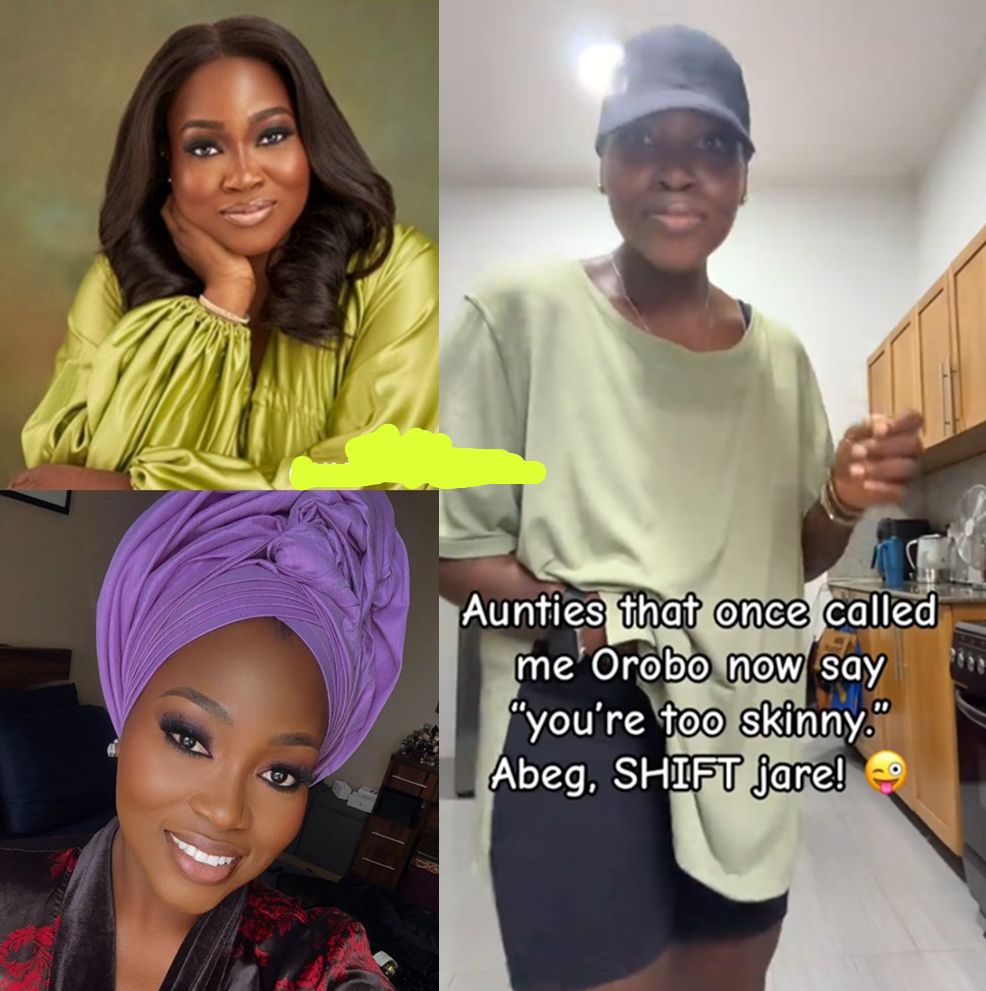
“Now They Say I’m Too Skinny”: Abimbola Craig Opens Up About the Irony of Her Weight Loss Journey

Nollywood actress and filmmaker Abimbola Craig has set social media abuzz with her candid revelation about her recent weight loss journey and the reactions that have followed from people around her. The actress, who is well-known for her role in the hit web series Skinny Girl in Transit, shared a post that has sparked widespread conversation about body image, societal expectations, and the ever-changing standards of beauty. In her words, “Aunties that once called me orobo now say I’m too skinny,” a statement that has resonated deeply with many who have faced similar scrutiny over their bodies.
Abimbola’s statement is more than just a passing remark—it highlights the persistent double standards women face when it comes to appearance. For years, the actress was publicly celebrated for embracing her plus-sized body and advocating self-love, becoming a symbol of confidence for many Nigerian women. Her character in Skinny Girl in Transit was a relatable figure, embodying the struggles and triumphs of a woman learning to love herself in a society obsessed with physical perfection. But as she continues her real-life journey toward health and fitness, Abimbola is now facing the irony of being criticized for becoming the very opposite of what she once was.
The actress’s transformation has been a topic of discussion for months, as fans noticed her slimmer frame in recent photos and appearances. While some have praised her for her discipline and dedication, others have made unsolicited comments suggesting she has lost too much weight. Abimbola’s post captures the frustration many women feel when they realize that no matter what they do, there will always be critics waiting to pass judgment. The people who once mocked her for being “too fat” are now the same ones claiming she’s “too skinny.” The statement underscores how body shaming can take different forms, both subtle and overt, regardless of size.
Social media users quickly rallied around the actress, with many expressing support and admiration for her transparency. Fans and colleagues praised her courage for speaking out against the constant policing of women’s bodies. “This is the reality for many of us,” one user commented. “You can’t please society. One minute they tell you to lose weight, the next they say you’ve lost too much.” Others pointed out how such remarks often come from people who think they mean well but end up perpetuating harmful narratives about body image and beauty standards.
Abimbola’s revelation has also reignited broader conversations about the pressure celebrities face to maintain certain appearances. In the entertainment industry, where image often carries as much weight as talent, many stars find themselves under constant scrutiny. The expectation to look “camera-ready” can lead to an endless cycle of dieting, gym routines, and public commentary that leaves little room for personal choice or peace of mind. Abimbola’s experience is a reminder that fame does not shield one from the sting of judgment; if anything, it amplifies it.
It is worth noting that Abimbola Craig has always been vocal about self-acceptance and mental health. Over the years, she has shared parts of her journey with honesty and humor, encouraging her followers to embrace self-care and authenticity. Her transformation, she insists, was not solely about aesthetics but about feeling healthier and more confident. In a world where body size often becomes a measure of worth, her stance has been refreshing and empowering. However, her latest comments show that even the most confident individuals can be affected by constant unsolicited opinions about their bodies.
The actress’s post also sheds light on a cultural issue that goes beyond celebrity life. In many African societies, body size has long been tied to perceptions of beauty, health, and wealth. Being “orobo” — a term often used affectionately or teasingly to describe someone who is chubby — was traditionally seen as a sign of good living. In recent years, however, Western beauty ideals emphasizing slimness have clashed with traditional views, leaving many women caught in between conflicting standards. As Abimbola’s experience demonstrates, this contradiction often results in women being judged no matter which side they fall on.
Her story has inspired others to share their own experiences of being body-shamed from both ends of the spectrum. Some recalled being mocked for losing weight after childbirth, while others spoke about being pressured to slim down before weddings or public events. The overwhelming consensus was that the constant commentary, whether framed as concern or compliment, can be deeply hurtful. Many agreed that the focus should shift from body size to overall well-being and happiness.
While Abimbola did not reveal how much weight she has lost or the methods she used, her appearance suggests a healthy transformation achieved through consistency and lifestyle changes. Fans have applauded her for prioritizing her health, noting that she looks radiant and more confident than ever. Yet, the backlash she has faced serves as a painful reminder that society often resists change, especially when it comes to how women choose to present themselves.
Despite the mixed reactions, Abimbola Craig remains undeterred. Her message is clear: no one should feel pressured to conform to anyone else’s expectations of beauty. Her humor-laced post, though simple, carries a powerful truth — that self-love means setting boundaries against external opinions. For her, the journey is about feeling good in her own skin, not meeting anyone’s definition of “perfect.”
As conversations about body positivity continue to evolve, Abimbola’s experience adds an important layer to the dialogue. It reminds us that body shaming is not limited to people on one end of the size spectrum; it affects everyone. The public’s tendency to oscillate between “you’ve gained too much” and “you’ve lost too much” reveals an ingrained obsession with controlling how others look. The irony is that these judgments often say more about the critics than the person being criticized.
In the end, Abimbola Craig’s story is one of resilience and self-empowerment. She stands as an example of a woman who has embraced transformation on her own terms, unapologetically and without validation from others. Whether orobo or skinny, she continues to radiate confidence and grace — a testament to the fact that true beauty lies not in numbers or appearances but in authenticity and peace of mind. As one of her fans aptly put it in the comments, “The same people who called you orobo will call you too skinny. Just live your life, Abimbola. You look amazing.”
Her words have since become a rallying cry for many women who are tired of society’s endless expectations. It is a reminder that no one has the right to define how another person should look. Abimbola Craig’s declaration, laced with humor and truth, cuts through the noise of judgment and hypocrisy, encouraging others to reclaim ownership of their bodies and their happiness. In a world where everyone seems to have an opinion about how others should live, her message stands tall — be yourself, love yourself, and let no one’s words weigh you down


